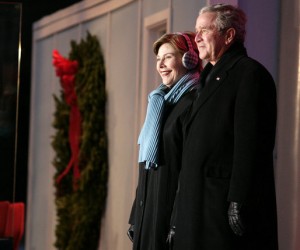The Right Prevail, with Peace on Earth, Good Will to Men

George W. Bush
December 4th, 2003
Throughout the Christmas season our thoughts turn to a star in the east, seen 20 centuries ago, and to a light that can guide us still. . . . The story of Christmas is familiar to us all, and it still holds a sense of wonder and surprise. When the good news came first to a young woman from Nazareth, her response was understandable. She asked, “How can this be?” The news would bring difficulty to her family and suspicion upon herself. Yet, Mary gave her reply, “Be it unto me according to Thy word.” The wait for a new king had been long, and the manner of his arrival was not as many had expected. The king’s first cries were heard by shepherds and cattle. He was raised by a carpenter’s son. Yet this one humble life lifted the sights of humanity forever. And in His words we hear a voice like no other. . . . We don’t know all of God’s ways, yet the Christmas story promises that God’s purpose is justice and His plan is peace. At times this belief is tested. During the Civil War, Longfellow wrote a poem that later became a part of a Christmas carol, “Hate is strong and mocks the song of peace on Earth, good will to men.” That poem also reminds us that hate is not the final word: “Then pealed the bells more loud and deep, ‘God is not dead, nor doth He sleep, the wrong shall fail, the right prevail, with peace on Earth, good will to men.’”
“Remarks on Lighting the National Christmas Tree,” The American Presidency Project, December 4, 2003, (https://www.presidency.ucsb.edu/ws/?pid=63610)




